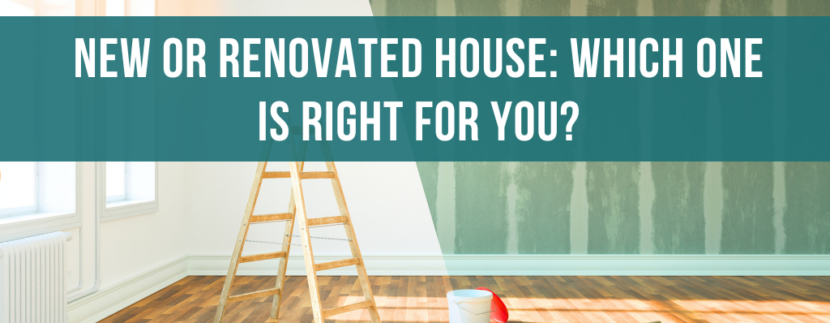New or renovated house: which one is right for you?

Buying a house is a major investment, both financially and emotionally. The choice between a new home and a renovation project can be complex, influenced by different needs, priorities, and budgets. To help you make an informed decision, here is a detailed analysis of the pros and cons of both options:
New house:
Advantages:
- Structural reliability and modern materials: Recent constructions offer greater safety and less risk of future problems. Innovative materials can improve energy efficiency and reduce running costs.
- Lower initial maintenance costs: New systems and finishes reduce the need for immediate interventions, alleviating initial expenses.
- Customization options: Freedom to choose finishes, layouts, and details to create a tailor-made environment from the design phase.
- Superior living comfort: Modern design is conceived to optimize spaces, favor natural light, and include advanced technologies for climate control and acoustics.
Disadvantages:
- Risks of construction defects: Possible problems such as cracks, leaks, or malfunctions in systems, with unforeseen repair costs.
- Lack of character and personality: Style often uniform and standardized, not suitable for those seeking a home with a unique soul.
- Higher prices: Higher purchase cost compared to renovated houses
- Geographic limitations: Availability concentrated in new development areas, with fewer options in established or central neighborhoods.
Renovated house:
Advantages:
- Lower purchase price: Possibility to save on the initial cost compared to new or already renovated houses.
- Potential increase in value: Smart renovation can significantly increase the market value of the property.
- Possibility to live in established neighborhoods: Wide choice in already developed areas, with established infrastructure, services, and neighborhood.
Disadvantages:
- Time and money commitment: Renovation requires planning, coordination of professionals, and careful budget management. Work can take months and unforeseen events can increase costs and timeframes.
- Risks of structural problems: Possibility of discovering unforeseen damage during the works, with additional costs and delays.
- Possibility of exceeding the budget: Unforeseen events, changes to the project, or changes in materials can easily inflate initial costs.
- Design limitations: Regulatory constraints and legal obligations may limit the freedom of renovation, influencing structural changes, external appearance, or choice of materials.
Ultimately, the choice between a new and a renovated house depends on:
- Individual priorities: If the priority is practicality and immediate peace of mind, a new house might be the best option. If instead you desire a unique and customizable home, with the possibility of saving money and living in an established neighborhood, a renovated house could be the more suitable choice.
- Available budget: Carefully evaluate your financial possibilities, considering both the purchase cost and the potential cost of the renovation.
- Time available: If you have little time to dedicate to the works and bureaucratic procedures, a new house might be the less demanding choice. If instead you have the time and desire to dedicate yourself to a personalized project, renovation can be a gratifying experience.
Regardless of the choice, it is essential to:
- Conduct thorough research: Evaluate different options, visit the properties, and compare their characteristics.
- Carefully evaluate the pros and cons: Do not be influenced solely by price or aesthetics, but consider all objective and subjective aspects.
- Define a realistic budget: Include any ancillary expenses such as renovation, moving, taxes, and other costs.
- Rely on competent professionals: Surveyor, architect, construction company, and financial advisor can provide support in evaluating the property, planning the renovation, and managing the works.
Additional considerations
- Personal preferences: Consider your lifestyle, needs, and tastes when making your decision. Do you prefer modern amenities and open spaces, or do you value historic charm and character?
- Location: Think about the location that best suits your needs. Do you need to be close to work, schools, or public transportation? Do you prefer a quiet suburban setting or an urban environment?
- Long-term plans: Consider your future plans when making your decision. If you plan to stay in the house for a long time, you may want to invest in a property that has the potential to appreciate in value.
Ultimately, the best way to decide whether to buy a new or renovated house is to carefully weigh your options and choose the one that best suits your individual needs and circumstances.

